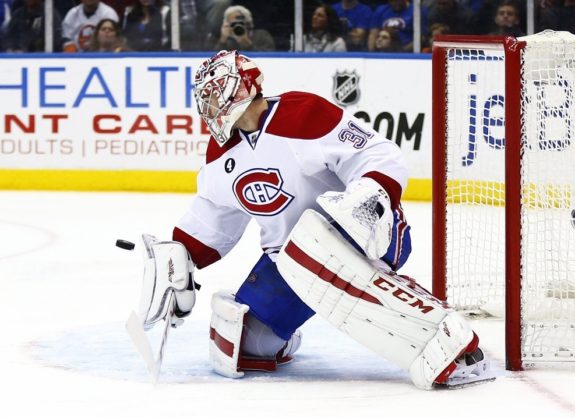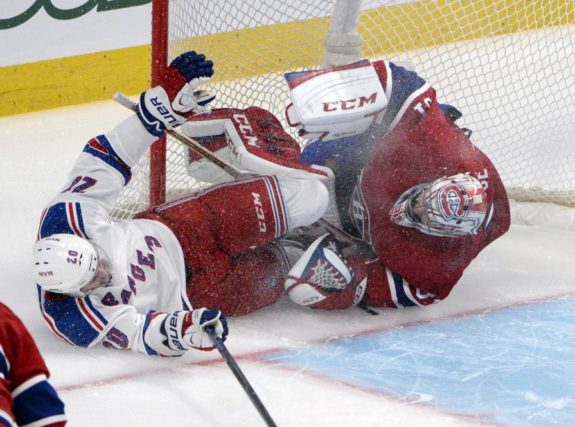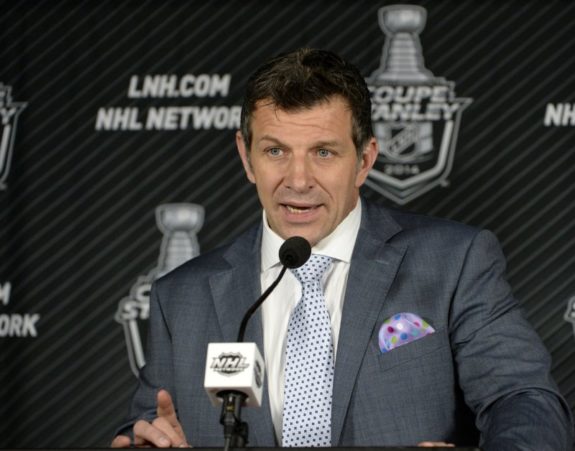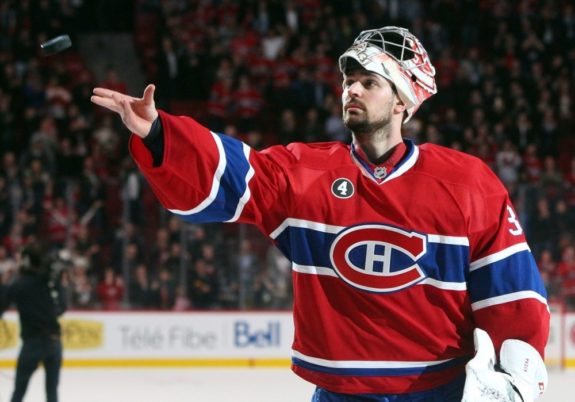Since winning the Hart Trophy in 2014-15, Carey Price has seen his numbers decline progressively. Some fans may be concerned that Price, who will turn 31 prior to the start of the upcoming season, is now past his prime and has started an inevitable decline. This decline is even more alarming when you consider that Price hasn’t even started his eight-year, $84-million extension yet. However, Geoff Molson and Marc Bergevin still believe Price can perform at an elite level, and this happens to be one of the few times I agree with them.
In Price We Trust
In the modern NHL, it’s unusual to make a goalie your highest-paid player. It is a poor allocation of cap space, since the increase in performance you will get by investing in a $10-million goalie versus a $5-million goalie is marginal. There are only 62 goalies playing in the NHL, and the caliber of your average goalie has improved tremendously. You are better off investing that cap space elsewhere. To illustrate the point, the increase in performance you would get by investing in upgrading from a $5-million center to a $10-million center is comparatively much more significant.

By signing Price in July 2017 to that ill-advised extension, the Canadiens were cementing Price as their franchise player for the next eight years, with the team’s success primarily hinging on him. Needless to say, the Habs were expecting much more than a 3.11 GAA and a .900 save percentage this past season.
What Happened Since Winning the Hart?
As I alluded to earlier, I’m far from convinced that Price’s decrease in performance is due to post-prime decline or long-term injury effects. In 2014-15, he posted a ridiculous 1.96 GAA and .933 save percentage. The season after winning the Hart, Price was plagued by injury and only played 12 games. Nonetheless, his GAA only increased slightly to 2.06, and his save percentage was still an amazing .934.

The 2016-17 season is where we start to see a notable drop in performance. Price ends the season with a GAA of 2.23, and a save percentage of .923, which is still very solid, but well below his peak performance level. However, the real story isn’t revealed simply by looking at the blended numbers over the season.
Prior to Dec. 16, he was 16-3-2, with a 1.8 GAA and a .940 save percentage. On Dec. 16, the Habs were playing the Sharks, and Price was pulled by then-coach Michel Therrien after letting in four goals on 18 shots. On his way off the ice, in a moment reminiscent of the infamous Patrick Roy/Mario Tremblay incident, Price gave Therrien the stare down. After that game, Price went 8-11-3, with a 3.11 GAA and an .895 save percentage, up until the moment Michel Therrien was fired on Valentine’s Day.
After Julien’s hiring, Price’s form miraculously recovered, and he went 13-6, with a 1.72 GAA and a .937 save percentage. Did he deliberately underperform to try to get Therrien fired? Was his anger at Therrien affecting his play? Whatever the reason, it’s safe to say that Price’s decline in performance that year probably wasn’t due to a physical loss of form.
Habs Need a Change in Attitude
The following season, the Habs finished 29th overall, and Price’s numbers dropped significantly. During the 2017-18 Canadiens post-mortem press conference, Molson and Bergevin repeated ad nauseam that “attitude” was to blame for the poor season, and that the Canadiens needed a change in “attitude”.
It was ironic to see both executives start the press conference talking about how much the team wanted to be more transparent, and then proceed to pepper most of their responses with very cryptic messaging around “attitude”. Having just listened to the press conference in its entirety for a second time to decipher the code, I become increasingly convinced that the “attitude” problem they kept referring to is Price’s attitude specifically.

Here are some quotes (mostly translated from French) to illustrate the theory.
Geoff Molson:
A change of attitude toward a winning attitude can do a lot to help a team improve.
“It was disappointing to lose vs. NYR last season in the playoffs. But there were no reasons to think we would be this bad this year. The five years before last season, we were top 10 in regular-season wins and games played in the playoffs—there was reason to believe we were good. I still believe we are good. We have the right elements to be good. I believe if the attitude changes, we will be much better next season.”
Our best players weren’t at their best last season. A change of attitude is required.
Marc Bergevin:
Whether I bring in better players or not, if the attitude doesn’t change, the results won’t change.
“You know what, Carey wasn’t good this year. We need Carey to be back to what he was. If Carey goes back to what he was doing, what he can do, we’re already a better team. You build from the goalie out. A lot of GMs will tell you that. It starts with Carey. He knows he needs to be better.”
Perhaps the most telling response was when Bergevin inadvertently linked “attitude” and Price in the same response. When Eric Engels asked him why he decided to revamp a defense that had just finished with the fourth-best defensive record in terms of goals against the previous season, Engels finished the question by acknowledging Price had a lot to do with that record, to which Bergevin promptly responded:
A lot! If Carey doesn’t have the season he had, we wouldn’t be talking about this. I believe the team attitude has to be a lot better.
Another telling moment was when Marc De Foy was able to decipher what “team attitude” was referring to and asked:
“Marc, you are talking a lot about attitude…You said you don’t think it’s a question of team spirit, which suggests that there are undesirable elements within the team. If these guys don’t have the right attitude, it could affect others. Does that mean we should expect those guys to be traded from the team? It just means there’s a problem in the dressing room.”
Interestingly, Molson interjected here:
I asked Marc the same question yesterday. The answer is that we can’t divulge everything today, but yes there are bad elements. And those that aren’t ready to change their attitude, won’t be here next season.
In the same exchange with De Foy, Bergevin added:
“From an attitude perspective, a performance perspective, Price had a difficult season. Guys like Carey don’t realize how much he can affect the team with this attitude. People look up to him.”
Price: The Hero the Habs Deserve?
When you look at these quotes, it becomes pretty evident that Bergevin and Molson believe Price’s performance played a big part in the Habs having a poor season. There is also reason to believe that they are referring to Price when talking about the change in “attitude” needed for the team to perform better next season. They could have simply repeated that “our best players have to be our best players for us to be successful” if they wanted to simply blame the season on underperforming superstars. Instead, they chose to use the word “attitude.” Why?

Could it be that Molson and Bergevin believe that Price’s sub-par season was deliberate? Could it be that Price was sulking after Bergevin got rid of puck-moving defensemen like Andrei Markov, Nathan Beaulieu and Mikhail Sergachev—the types of defensemen needed to succeed in the modern NHL—and unnecessarily overhauled a defense that had just finished fourth-best in goals against? Could it be that they believe Price, empowered after having secured a long-term contract, and having possibly already intentionally underperformed to get Therrien fired, was trying to use the same strategy to get Bergevin fired?
Maybe I have an overly vivid imagination. What is clear is that the team’s fortunes currently depend a whole lot on Price, and the Habs’ brain trust believes that they have a team in place that is capable of performing much better—provided the team has the right “attitude” moving forward. And as Molson said, if the players in question don’t change their “attitude,” they may very well not be with the team for much longer.
But does Price share the belief that the Habs are set up to really contend? What if Price’s “attitude” is ultimately the right attitude to save the Habs, contrary to what Molson thinks? What if, all along, Price has been the hero the Habs need, but not the hero the Habs organization deserves?